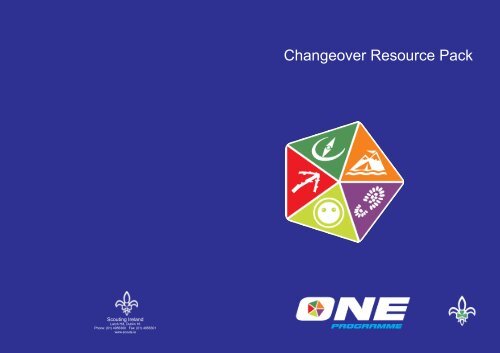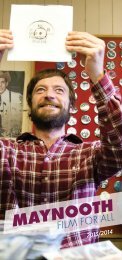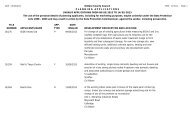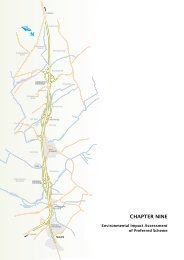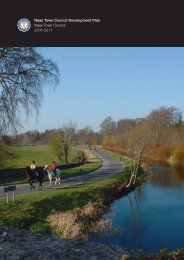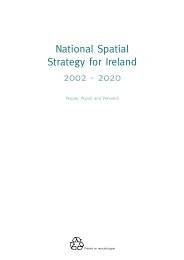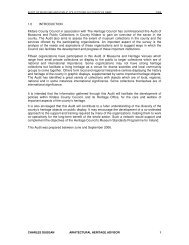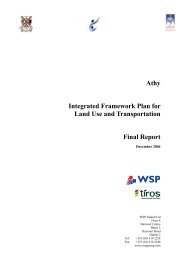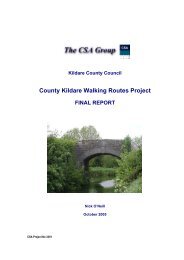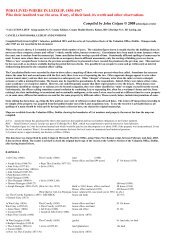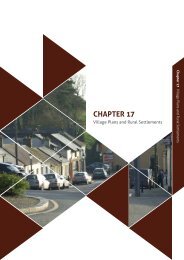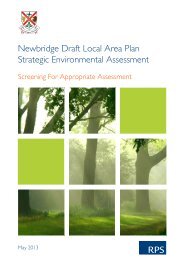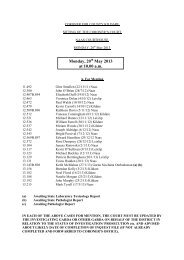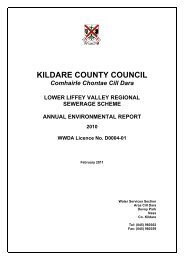Changeover Resource Pack - Kildare.ie
Changeover Resource Pack - Kildare.ie
Changeover Resource Pack - Kildare.ie
Create successful ePaper yourself
Turn your PDF publications into a flip-book with our unique Google optimized e-Paper software.
Scouting Ireland<br />
Larch Hill, Dublin 16<br />
Phone: (01) 4956300 Fax: (01) 4956301<br />
www.scouts.<strong>ie</strong><br />
<strong>Changeover</strong> <strong>Resource</strong> <strong>Pack</strong>
Introducing the <strong>Changeover</strong> <strong>Pack</strong><br />
This <strong>Resource</strong> <strong>Pack</strong> has been developed to help you changeover to the new youth programme in your Scout<br />
Group. Most of you, as you read this, will be at a County Br<strong>ie</strong>fing & Planning Meeting or will have recently<br />
attended one where this resource pack was distributed.<br />
Supporting every Scout Group in the country to changeover to this new programme is a big task for the<br />
Association and will take some time. Here is a short summary of the story so far:<br />
•<br />
•<br />
•<br />
It really started towards the end of 2009 when trainers from each Province were trained in<br />
the main aspects of the new programme so they would be ready to deliver the same training<br />
to you at Group level.<br />
Training & Planning Days were run in each Province during January and the start of February<br />
2010. These events were targeted for the Provincial team and for certain people from the<br />
County teams.<br />
County Br<strong>ie</strong>fing & Planning Meetings are being held during the months of February and<br />
March. These events are targeted for the County team and for certain people from each<br />
Group. This resource pack is being distributed at each of these meetings.<br />
We will be using the normal structures of Scouting Ireland to support you during the changeover to the new<br />
youth programme. In addition, some people have taken on additional temporary roles to help us through<br />
this period of change.<br />
•<br />
•<br />
•<br />
Some trainers have formed a panel in each Province to deliver the Group Training & Planning<br />
Days and to help with the other training and br<strong>ie</strong>fing events mentioned earl<strong>ie</strong>r, these panels<br />
are being supervised by Provincial Training Coordinators and the Training Commissioner.<br />
The County Programme Coordinator has been asked to appoint one or more ‘Mentor’ to<br />
provide direct support to Groups with the changeover. These Mentors are being supervised<br />
by the County Programme Coordinator and the County Board.<br />
Each Group has been asked to appoint one person to act as a <strong>Changeover</strong> Coordinator to<br />
support the Group Council and the Group Leader with the changeover.<br />
You will probably have met your Mentor at the County Br<strong>ie</strong>fing & Planning Meeting, you should involve<br />
your Mentor in your Groups decision and rev<strong>ie</strong>w meetings from now right up to the time when you have<br />
successfully completed the changeover.<br />
Now that your Group has attended your County Br<strong>ie</strong>fing & Planning Meeting you need to start working on<br />
your Group <strong>Changeover</strong> Plan and getting ready for your Group Training & Planning Day. This resource pack<br />
should be of some help to you in your preparations. You are encouraged to hold a meeting with all youth<br />
leaders and Scouters in the Group to consider the contents of this resource pack and to start using it. It is<br />
intended that you would work through it in the sequence presented below.
•<br />
•<br />
•<br />
•<br />
•<br />
•<br />
•<br />
•<br />
Mythbusters, a short document to answer many of the questions we get asked most about<br />
the new programme<br />
Overv<strong>ie</strong>w of the changeover plan, to help you put things into context<br />
Forming new Age Sections, a short paper to help you to complete this important step<br />
Implementing Youth Leadership, to help you to get youth leadership working in each of the<br />
new age Sections<br />
A summary of the Scout Method, to allow you to check how you are doing with this and to be<br />
sure you have it working in each of the new age Sections and at your Group Council<br />
Planning for skills and equipment in all Sections, to help you to assess what resources you<br />
have available and to help you to create a plan to fill any gaps<br />
Sample Communications materials, suggested templates to use when communicating to the<br />
youth members, their parents, your local community<br />
Assessing progress towards the new programme, to act as a guide to all of the steps you<br />
should follow to get ready<br />
So next steps you should take are:<br />
•<br />
•<br />
•<br />
If you have not yet appointed a Group <strong>Changeover</strong> Coordinator, do it now<br />
Get this person to contact your Mentor from the County team and swap contact details<br />
Get together with the youth leaders and Scouters in your Group, share this pack and start<br />
working through it<br />
The very best of luck with the changeover!<br />
If you have any observations or suggestions about this pack please mention them to your<br />
Mentor and send them to progdev@scouts.<strong>ie</strong>.
Index<br />
Implementing the new youth programme at Group level 5<br />
Role of the Group <strong>Changeover</strong> Coordinator 11<br />
Role of County Mentor 12<br />
Mythbusters 13<br />
Outline of the meetings which must be arranged to<br />
launch the new programme 17<br />
Suggested Approach to forming new Age Sections 19<br />
Why Youth Leadership? 21<br />
Implementing the Scout Method in All Sections 25<br />
Assessing skills and equipment 29<br />
Sample letter to Parents 33<br />
Assessing Progress towards Implementing the Programme 35
Implementing the new youth programme at Group level<br />
Learn about the <strong>Changeover</strong><br />
Invitation to a County Br<strong>ie</strong>fing & Planning Meeting<br />
The Group receives an invitation to a special County level meeting where a<br />
br<strong>ie</strong>fing about the rollout of the new youth programme will take place.<br />
This meeting is attended by the Group Leader (GL) and the Group<br />
<strong>Changeover</strong> Coordinator (see just below for an explanation about the<br />
Group <strong>Changeover</strong> Coordinator)<br />
Discuss at Group Council<br />
The invitation to the County Br<strong>ie</strong>fing & Planning Meeting contains<br />
information which can be used to spark discussion at Group Council prior<br />
to attending that meeting.<br />
Matters to be discussed will include:<br />
• How the Group will manage the changeover; in particular<br />
who will coordinate things, the Group Leader or someone<br />
else (the <strong>Changeover</strong> Coordinator).<br />
• <strong>Changeover</strong> timetable - when would suit the Group?<br />
• Questions people have<br />
County Br<strong>ie</strong>fing & Planning Meeting<br />
Group representatives (Group Leader and/or <strong>Changeover</strong> Coordinator)<br />
attends as well as the following:<br />
•<br />
•<br />
•<br />
Professional team<br />
§ Programme Support Officer (PSO) & Group Support Facilitator<br />
(GSF)<br />
Trainers<br />
§ Those on the Provincial panel who will deliver the “Training<br />
Days” for the County<br />
Mentor(s)<br />
§ One or more people who are tasked by the CMC with<br />
supporting Groups in the County with the changeover<br />
The Professional team, Trainers and Mentors will already have been<br />
br<strong>ie</strong>fed and trained for their roles in the changeover.<br />
This meeting provides the attendees with an outline of the programme<br />
components, as well as the resources which will be available to implement<br />
it and the recommended approach to changeover.<br />
Groups commit to begin the process and a Group <strong>Resource</strong> <strong>Pack</strong> is<br />
provided to the Group representatives who have attended.<br />
Jan- Feb 2010<br />
Feb - Mar 2010
Prepare for the <strong>Changeover</strong><br />
Discuss at Group Council<br />
Group Leader and/or Group <strong>Changeover</strong> Coordinator report back to Group<br />
Council and introduce the <strong>Changeover</strong> <strong>Resource</strong> <strong>Pack</strong>.<br />
This resource breaks down the changeover into manageable steps and will<br />
provide some support for the Group in managing its own preparations for<br />
changeover.<br />
Support is also available from the County team and the professional staff.<br />
The Provincial team provides an overall coordinating role.<br />
Prepare the <strong>Changeover</strong> Plan<br />
Group Council meets to discuss the plan for preparing to implement the<br />
new programme. Matters to be considered include:<br />
• Approach to forming Sections and Small Teams / Patrols<br />
• Scouter assignments<br />
• Youth Leaders appointed in each Section<br />
• Adventure Skill instruction, is there a need for assistance?<br />
• Use of group equipment, managing the change<br />
• Date for Group Training & Planning Day, when suits?<br />
• Date for programme implementation, when would work?<br />
The resource pack contains guidelines and suggestions for preparing this<br />
plan.<br />
The Group Leader or Group <strong>Changeover</strong> Coordinator discusses the<br />
<strong>Changeover</strong> Plan with the Mentor and seeks their input.<br />
Group Training & Planning Day<br />
Attended by all Scouters, others on Group Council, all youth leaders.<br />
Comprises a half day familiarisation with the new youth programme and a<br />
half day to rev<strong>ie</strong>w and finalise the <strong>Changeover</strong> Plan.<br />
Commit to the <strong>Changeover</strong> Plan<br />
The Group Council meets again to finalise the timetable and commit to the<br />
<strong>Changeover</strong> Plan, ideally the Mentor should be present for this meeting of<br />
Group Council.<br />
Communicate the <strong>Changeover</strong> Plan<br />
Br<strong>ie</strong>f the parents of youth members, some resources will be suppl<strong>ie</strong>d in the<br />
resource pack to help with this.<br />
Inform all youth members about the proposed implementation approach<br />
and timetable.<br />
The sequence of br<strong>ie</strong>fings should be planned to ensure that older youth<br />
members are consulted with and informed appropriately, the older the<br />
Scout the more they should know about what is involved before their<br />
parents are informed.<br />
6 - 8 weeks,<br />
(starting sometime from<br />
March 2010 onwards)<br />
1 evening<br />
2 evenings<br />
or 1 half day over<br />
a period of 4 - 6<br />
weeks with actions<br />
in between<br />
1 Day<br />
1 evening<br />
or half day<br />
1 - 2 weeks
First Programme Cycle, to introduce the key components<br />
The Group runs the first Programme Cycle as prepared at the Group<br />
Training & Planning Day.<br />
Establish / reinforce the practice of Plan-Do-Rev<strong>ie</strong>w in each Section.<br />
Establish / reinforce the appropriate Youth Participation model for each<br />
Section.<br />
Consider progress towards Learning Objectives; start the youth members<br />
considering Personal Challenges.<br />
Meet as a Group Council to evaluate first Programme Cycle.<br />
The resource pack will include a tool to facilitate this evaluation.<br />
Mentor attends if requested by the Group.<br />
Any questions/issues raised at this stage are addressed and responses<br />
planned.<br />
Celebrate the first Programme Cycle.<br />
Second Programme Cycle, to help get used to all<br />
components<br />
Plan the second Programme Cycle, reinforce the practice of Plan-Do-<br />
Rev<strong>ie</strong>w in each Section.<br />
Reinforce the appropriate Youth Participation model for each Section.<br />
Establish the rev<strong>ie</strong>w of progress towards Learning Objectives through<br />
Personal Challenges and the appropriate mapping methods,<br />
Incorporate Stage 1 for selected Adventure Skills.<br />
Attempt some Special Interest Badges.<br />
Evaluate the second Programme Cycle.<br />
Celebrate the second Programme Cycle with a Group event to mark the<br />
changeover to the new programme.<br />
Consider organising a Group weekend activity or a Group Family Day.<br />
Consider having a Badge/Pin/Memento to mark the occasion.<br />
Rev<strong>ie</strong>w of Progress to date, input from youth members<br />
and Scouters<br />
Mentor meets with the same people who attended the Training Day. They<br />
facilitate the Group in rev<strong>ie</strong>wing progress to date, as well as identifying<br />
any problems and areas for further work.<br />
Areas to rev<strong>ie</strong>w include:<br />
• Use of the Scout Method including the Small Team / Patrol system<br />
in each Section<br />
4 - 6 Weeks<br />
3 - 4 months<br />
1 Day
• Use of the programme Cycle : Plan-Do-Rev<strong>ie</strong>w<br />
• Progress with Learning Objectives<br />
• Effectiveness of evaluation and personal rev<strong>ie</strong>w<br />
• Adventure Skills take-up and quality of instruction<br />
• Use of Special Interest Badges in implementing the core<br />
programme components<br />
• Scouter allocations and training of Scouters<br />
• Use of adults other than Scouters (particularly as instructors or<br />
coaches)<br />
• Availability and use of Group equipment<br />
• Availability and use of funding<br />
An Action Plan for the Group is created as a result of this rev<strong>ie</strong>w.<br />
Feedback to the Programme Development Unit via the Mentor, so that<br />
support material/training/toolkit can be amended/improved.<br />
Support to other Groups<br />
The Group should now be in a position to provide support, advice and<br />
encouragement to other Scout Groups embarking on the changeover<br />
process. This should be facilitated by the Mentor and the County team.<br />
Further steps which could be used if required<br />
Third Programme Cycle to further try out all of the<br />
components and phases<br />
Plan a third Programme Cycle.<br />
Consider progress towards the major activity for the year, for example<br />
summer camp.<br />
Reinforce the practice of Plan-Do-Rev<strong>ie</strong>w in each Section.<br />
Reinforce the appropriate Youth Participation model for each Section.<br />
Reinforce the rev<strong>ie</strong>w of progress towards Learning Objectives through<br />
Personal Challenges and the appropriate methods, ensure the youth<br />
members are engaging in personal evaluation.<br />
If the youth members have completed Stage 1 of an Adventure Skill then<br />
incorporate Stage 2 or commence Stage 1 for another Adventure Skill.<br />
Make further progress with Special Interest Badges.<br />
Evaluate the third Programme Cycle.<br />
Celebrate the third Programme Cycle.<br />
7 - 8 months after<br />
starting<br />
3 - 4 Months
Fourth Programme Cycle to establish all components are<br />
in every-day use<br />
Plan a fourth Programme Cycle, culminating in the major activity for the<br />
year.<br />
Support Plan-Do-Rev<strong>ie</strong>w and the appropriate Youth Participation model as<br />
the norm in each Section.<br />
Actively support regular use of the appropriate mapping methods to<br />
rev<strong>ie</strong>w progress towards Learning Objectives through Personal Challenges,<br />
support personal evaluation as the norm.<br />
Continue to pursue further Adventure Skills appropriate to the age range<br />
of each youth member.<br />
Ensure Special Interest Badges are exercising Plan-Do-Rev<strong>ie</strong>w and that<br />
they are causing progress with Learning Objectives.<br />
Evaluate the Programme Cycle<br />
Celebrate the Programme Cycle, perhaps on the major activity of the year;<br />
summer camp, expedition, etc.<br />
Thorough rev<strong>ie</strong>w of progress after a year of using the<br />
new youth programme<br />
The Group meets with their Mentor for a final time to rev<strong>ie</strong>w progress.<br />
Areas to rev<strong>ie</strong>w include:<br />
• Use of the Scout Method including the Small Team / Patrol system in<br />
each Section<br />
• Use of the programme Cycle - Plan-Do-Rev<strong>ie</strong>w<br />
• Progress with Learning Objectives<br />
• Effectiveness of evaluation and personal rev<strong>ie</strong>w<br />
• Adventure Skills take-up and quality of instruction<br />
• Use of Special Interest Badges in implementing the core programme<br />
components<br />
• Scouter allocations and training of Scouters<br />
• Use of adults other than Scouters (particularly as instructors or<br />
coaches)<br />
• Availability and use of Group equipment<br />
• Availability and use of funding<br />
Group updates its Action Plan following the rev<strong>ie</strong>w and begins to plan for<br />
the upcoming Scouting year.<br />
Feedback to the Programme Development Unit via the Mentor, so that<br />
the training, materials and the resource pack can be amended and<br />
improved.<br />
3 - 4 Months<br />
1 Day
Role of the Group <strong>Changeover</strong> Coordinator<br />
All Group <strong>Changeover</strong> Coordinators in the County shall report to the County Management Committee<br />
via the Group Leader for the duration of their role<br />
The Group <strong>Changeover</strong> Coordinator role will include:<br />
•<br />
•<br />
•<br />
•<br />
•<br />
Contact for the Group in relation to implementing the new programme<br />
Providing advice, support and guidance to the Group Council for the duration of their changeover<br />
Coordinating Group Training & Planning Day and ensuring attendance<br />
Acting as a means of communication between Group and County<br />
Advising the Group Council of progress as well as challenges/issues<br />
They will do this by:<br />
•<br />
•<br />
•<br />
•<br />
Attending County Br<strong>ie</strong>fing & Planning Day<br />
Familiarising themselves with the programme content and approach<br />
Meeting regularly with the other Group <strong>Changeover</strong> Coordinators<br />
Maintaining regular contact with the Group Council and County Mentor<br />
Successful Group <strong>Changeover</strong> Coordinator will:<br />
•<br />
•<br />
•<br />
•<br />
Be committed to supporting the successful implementation of the new programme<br />
Have a reasonable availability of time to carry out the role<br />
Be approachable and supportive<br />
Enthuse and support; rather than lead and direct<br />
Working with<br />
Scout Group Council, Group Leader, County Mentor<br />
Accountable to<br />
Scout Group Council, Group Leader<br />
Qualifications<br />
Full knowledge and understanding of the Aims and Polic<strong>ie</strong>s of the Association<br />
If the candidate is not currently a registered member of Scouting Ireland then they should go through<br />
the process<br />
* Role of Group Leader<br />
The role of the Group Leader during the changeover will be to enable the smooth transition to ‘One<br />
Programme’ by working closely with the Group Council, the Group <strong>Changeover</strong> Coordinator and the<br />
County Mentor
Role of the County Mentor<br />
All Mentors in the County should report to the County Management Committee via the CPC for the<br />
duration of their role.<br />
The Mentors role will include:<br />
•<br />
•<br />
•<br />
•<br />
•<br />
Contact for specific Groups in relation to implementing the new programme<br />
Providing advice, support and guidance to those Groups for the duration of their changeover<br />
Coordinating Group Planning & Training Days<br />
Acting as a means of communication between County and Group<br />
Advising the County Management Committee (via the CPC) of progress as well as challenges/issues<br />
They will do this by:<br />
•<br />
•<br />
•<br />
•<br />
•<br />
Attending Provincial Training & Planning Day<br />
Familiarising themselves with the programme content and approach<br />
Playing a lead role in the County Br<strong>ie</strong>fing & Planning Meeting<br />
Meeting regularly with the other mentors and the CPC<br />
Maintaining regular contact with the Group and meeting with the Group <strong>Changeover</strong> Coordinator<br />
Successful Mentors will:<br />
•<br />
•<br />
•<br />
•<br />
Be committed to supporting the successful implementation of the new programme<br />
Have a reasonable availability of time to carry out the role<br />
Be approachable and supportive<br />
Enthuse and support; rather than lead and direct<br />
Working with<br />
Group <strong>Changeover</strong> Coordinator, County Mentor(s), County Programme Coordinator<br />
Accountable to<br />
County Programme Coordinator<br />
Qualifications<br />
Full know knowledge and understanding of the Aims and Polic<strong>ie</strong>s of the Association.<br />
If the candidate is not currently a registered member of Scouting Ireland then they should go through<br />
the process of registration.
Mythbusters<br />
Will the One Programme make all my Group’s<br />
existing traditions disappear? Will it try to<br />
erase history?<br />
Absolutely not. The One programme fully allows<br />
you to hold on to your traditions and it will<br />
encourage you to put in place some new ones<br />
as well. The One programme isn’t setting out to<br />
destroy history; it may even lead to history being<br />
made. The One programme isn’t saying that<br />
everything we all do in Scouts up to now is wrong<br />
it’s just adapting to the times.<br />
Will One programme destroy the Patrol<br />
System and the fundamental aspects of<br />
Scouting?<br />
The infrastructure for Scouting will remain the<br />
same, the changes won’t be as dramatic as they<br />
have been made out and it really isn’t setting out<br />
to destroy anything, in fact more of the patrol<br />
system (working in small teams) will be expected<br />
in every Section with the One Programme. Any<br />
changes that are being made have been thoroughly<br />
thought through and not just by adults who<br />
haven’t been involved in programme with Scouts<br />
in years, any of the Scouts who have worked on<br />
developing the programme fully bel<strong>ie</strong>ve that the<br />
changes been made are for the good of the Scouts<br />
taking part.<br />
Who will the new age changes affect? Will<br />
they separate fr<strong>ie</strong>nds?<br />
The ages will most affect the Cub Scout and<br />
Beaver Scout Sections. Some Groups may go on to<br />
operate Scouts and Venture Scouts as one unit and<br />
on one meeting night, however the appropriate<br />
programme must be used by the Scouts and by<br />
the Venture Scouts. Ages set out for the Sections<br />
will act as guidelines and won’t be set in stone,<br />
this will allow the individual member decide when<br />
they are ready to move to an older Section. The<br />
One programme will allow older Scouts who have<br />
been left to take on the leader role presently<br />
to take part in a programme that interests<br />
them and will benefit them through outside<br />
qualifications as they progress. The addition of<br />
the Rover Scout Section it will give the Scouts who<br />
presently are lost in the oblivion between Venture<br />
Scouts and being adult leaders an active role in the<br />
Association.<br />
Why change the programme? It works well<br />
for my Group.<br />
While some Groups may be flourishing under the<br />
present programme many Groups around the<br />
country have “packed Cub Scout Sections with a<br />
severe loss of numbers when members reach the<br />
Scout Section age. This may be because suddenly<br />
it isn’t the cool thing to do. When this issue is so<br />
widely spread it becomes something that needs to<br />
be addressed. While the fundamentals may already<br />
be there something can always be improved on,<br />
it’s not fair to all the Cub Scouts who are missing<br />
out on their Scout adventure, if it can be helped it<br />
must be.<br />
Will the One Programme make scouts like<br />
being in school?<br />
Many Scout Groups at present keep a Deck Log<br />
and Sections will keep their own log. The One<br />
Programme gives each member the opportunity<br />
and tools to keep a personal log. It then goes one<br />
step further and gives this personal log a usage<br />
by basing the member’s journey through the<br />
progression and badge scheme around it. The One<br />
Programme promotes the keeping of a written<br />
log, a tradition which may have been lost in<br />
recent times. The keeping of the log isn’t set out<br />
in a manner which makes it tedious, it takes on a<br />
functional role.
Is the One programme making Scouts<br />
too “touchy feely”? We never had the SPICES<br />
before why do we need to use them now?<br />
When people initially hear about the SPICES it<br />
does appear that way, but they do serve a purpose<br />
and are not something al<strong>ie</strong>n to the Scouting<br />
message. A good programme following the present<br />
programme will have unknowingly captured many<br />
of the SPICES anyway. The One Programme just<br />
allows people acknowledge what they’ve ach<strong>ie</strong>ved<br />
rather then letting the exper<strong>ie</strong>nces pass people by<br />
and they not gaining from them. The SPICES will<br />
act as a guideline for developing future programme<br />
ideas and will be weaved into the progression<br />
badge scheme.<br />
My Scouts won’t want to do Plan-Do-Rev<strong>ie</strong>w,<br />
it’s just going to be too much hassle!<br />
If it is seen as work and done in a formal<br />
manner, true no one will want to take part, but<br />
this is not the case. In reality you probably already<br />
take part in this process without knowing it. When<br />
you take part in a Troop activity, then naturally<br />
on the way home or after it you will have a chat<br />
about how the activity went. It doesn’t need to be<br />
formal or a chore.<br />
What age are Rovers, how will this section<br />
affect the present age ranges and the system<br />
that we have successfully followed for many<br />
years in Sea Scouting?<br />
Rover Scouts are 18-21 years; this fits well into<br />
the existing Sea Scouting age ranges in my<br />
Group. At present we call this Section Ventures.<br />
Interestingly, through research I discovered that a<br />
most renowned Irish Sea Scout (Eoin Lavelle) was<br />
a member of the first ever Rover crew founded in<br />
Dublin University (Trinity) in March 1933.<br />
Rover Scout Sections will be reaching out more into<br />
soc<strong>ie</strong>ty by way of setting up contacts in Universit<strong>ie</strong>s<br />
etc. There will be still be challenges; for example:<br />
Moot, Explorer Belt and opportunit<strong>ie</strong>s to equip<br />
oneself with additional skills and recognised<br />
qualifications.<br />
An added advantage of holding onto this age group<br />
is that the Group retains members for longer thus<br />
increasing the pool from which to recruit young<br />
leaders.<br />
Who does the Plan-Do- Rev<strong>ie</strong>w… Scouts,<br />
Patrol Leaders?<br />
It is my understanding that the One Programme is<br />
lead by the youth members with the support of the<br />
adult leaders (Scouters). The programme is more<br />
about personal progression, the new Ch<strong>ie</strong>f Scouts<br />
Award for each Section is an example of this. There<br />
will be adventure challenges along the way. It is a<br />
personal journey being taking by all members but<br />
not everyone will follow the same route.<br />
What are SPICES and how are they<br />
incorporated into existing programme? Will<br />
it involve a lot of school type developmental<br />
goals?<br />
SPICES, sound like a lot of formal educational<br />
style learning but really its not, when you think<br />
about Scouting and what we do, for example the<br />
responsibilit<strong>ie</strong>s that are given to youth leaders,<br />
we are pursuing the SPICES already within the<br />
programme. In the One Programme there will be<br />
more emphasis on the different areas but not so<br />
that it is going to seem like school. I don’t think<br />
any youth Leader is going to be sitting down filling<br />
out forms based on the SPICES making sure that<br />
everyone in her/his Patrol is ticking all the boxes<br />
(Physical, Spiritual, etc.) but I do think that the Sea<br />
Scouting programme has plenty of scope for this<br />
direction of challenge and personal progression.<br />
Will the new (One) Programme take on more of a<br />
youth club style or will we be able to maintain our<br />
identity as a thriving Sea Scouting Group and an<br />
active part of the Scouting Movement.<br />
It is one of the key points that activit<strong>ie</strong>s are carr<strong>ie</strong>d<br />
out using the Scout Method; so there is no chance<br />
that Scouting Ireland will suddenly take on a youth<br />
club image. There is a specific programme to be<br />
followed, there are guidelines and adult leaders<br />
(Scouters) to help support and facilitate the<br />
implementation. It will be up to individual Groups<br />
how and when this will happen.
What do I do with my Scouts that are half way<br />
through their old Progressive Scheme - do I<br />
have to start again?<br />
No you won’t. No badges have to come off your<br />
uniform. After all you have earned them however<br />
the new personal progression scheme is different<br />
so you can’t ‘trade’ them in.<br />
With the new programme is the Ch<strong>ie</strong>f Scout’s<br />
Award going away?<br />
The Ch<strong>ie</strong>f Scout’s Award has been extended to all<br />
five Sections. For the last three Sections you can<br />
also ach<strong>ie</strong>ve the Bronze Silver and Gold Gaisce or<br />
Duke of Edinburgh Award while working on your<br />
Ch<strong>ie</strong>f Scout’s Award.<br />
Is it true that the Scout and Venture Scout<br />
Section will be basically the same in the One<br />
Programme?<br />
Not at all. In fact, there are core components to the<br />
One Programme which apply in ALL Sections; the<br />
use of the Scout Method and Programme Cycle, a<br />
Personal Progression Scheme based on the areas<br />
of Growth (SPICES), progressive Adventure Skills,<br />
Special Interest Badges, Nautical Badges, a Ch<strong>ie</strong>f<br />
Scout’s Award for each Section. At the same time,<br />
each Section has its own identity and its own way<br />
of approaching things; these are illustrated in the<br />
Section Handbooks. So One Programme is a single,<br />
progressive programme but presented to each<br />
Section in a way which is appropriate for the age<br />
range in that Section.<br />
Can a Rover be a Scouter?<br />
The starting age for Scouters is 18; so, unless the<br />
National Management Committee or National<br />
Council changes the association’s policy a person<br />
can be a Rover Scout and also a Scouter at the<br />
same time. We would, of course, encourage every<br />
person aged 18 - 21 to participate in an active<br />
Rover Scout programme so as to finish of their<br />
learning under the One Programme.<br />
Will the Scouting Trail still be used in Scouting<br />
Ireland? I heard the badge book is being<br />
replaced. What new books will we be getting?<br />
The Scouting Trail will still be referred to as a<br />
reference for Scouting Skills, so too will KUBUK<br />
and The Sea Scout Handbook, along with a lot<br />
of other existing Scouting publications. A new<br />
handbook for members of each Section has been<br />
produced to support the One Programme and also<br />
a Scouters Handbook and a book on the Adventure<br />
Skills requirements. In a while, when the One<br />
Programme has settled in a bit we might look at<br />
producing some new reference material which is<br />
geared more at the needs of Scouts and Scouters<br />
using the One Programme. In the meantime, the<br />
Programme section of the Associaton’s website<br />
(www.scouts.<strong>ie</strong>) will be kept updated with<br />
additional support material as it is developed.<br />
Will I have to repeat my training, I am<br />
currently half way through my Woodbadge.<br />
You will not have to repeat your training. As part of<br />
the rollout of the One Programme each Group will<br />
be provided with a Group Training & Planning Day<br />
to help all leaders (youth leaders and Scouters) to<br />
understand the new programme and to plan how<br />
best to introduce it into the Group. The Training<br />
Commissioner is currently revising the Woodbadge<br />
courses and Skills Training so as to make them<br />
more suitable for the One Programme. You might<br />
decide to attend one or more of the amended<br />
courses, even if you have done the older version,<br />
but that will be up to you.<br />
Will the One Programme affect the older<br />
Sections more?<br />
The One Programme will bring about changes in<br />
ALL Sections, the core programme components<br />
will seem a bit different to what most have been<br />
doing in the past. All Sections will be expected to<br />
implement the Scout Method fully and to involve<br />
the youth members in decision making about their<br />
programme. The Personal Progression Scheme<br />
is presented in a new way and may take a bit of
getting used to. The Adventure Skills will be a<br />
bit more structured than skills development was<br />
for many before. The Special Interest Badges will<br />
provide the opportunity to gain credit for your<br />
other interests, providing your ach<strong>ie</strong>vements<br />
are based on the idea of Plan-Do-Rev<strong>ie</strong>w and<br />
that you consider what progress with the PPS<br />
they are helping you with. The Nautical Badges<br />
will provide every youth member, whether a<br />
member of a Sea Scout Group or not, to build up<br />
their maritime knowledge and skills. Every youth<br />
member in every Section now has the opportunity<br />
to ach<strong>ie</strong>ve the Ch<strong>ie</strong>f Scout’s Award by following<br />
the One Programme in a persistent manner during<br />
their time in the Section. The amount of change<br />
you will notice will depend a lot on what sort of<br />
programme your Section was using up to now.<br />
There is no reason to bel<strong>ie</strong>ve that the One<br />
Programme will affect older Sections more than<br />
younger ones; but it is anticipated that the One<br />
Programme will enable a better programme<br />
exper<strong>ie</strong>nce in all Sections and that one effect may<br />
be a growth in numbers generally and in particular<br />
in the numbers in the older Sections.<br />
Who decides what in this process?<br />
As with all important decisions, it is your Group<br />
Council that will decide how best to approach<br />
the changeover to the One Programme and what<br />
timeframe will work for your Group.
Outline of the meetings which must be arranged to launch the new programme<br />
Date Name Responsibility Purpose Method / Duration<br />
Full Day Meeting<br />
Train Provincial Teams and members of County Teams<br />
Start to plan sequence for Province<br />
Provincial Training & Planning Day Logistics: Provincial Team<br />
Content: Programme Team<br />
Jan-Feb<br />
2010<br />
2-3 hours<br />
Br<strong>ie</strong>f members of every Group<br />
Start to plan sequence for County<br />
County Br<strong>ie</strong>fing & Planning Day Logistics: County Team<br />
Content: Provincial Team<br />
Feb-Mar<br />
2010<br />
1-2 hours, multiple times<br />
until ready<br />
Group meeting for all leaders Group <strong>Changeover</strong> Coordinator Br<strong>ie</strong>f any remaining member of the Group<br />
Use the <strong>Resource</strong> <strong>Pack</strong> to start preparations<br />
Prepare Group <strong>Changeover</strong> Plan<br />
Request Group Training & Planning Day when ready<br />
Mar-Apr<br />
2010<br />
Full Day Meeting<br />
Train all leaders in the Group (including youth leaders)<br />
Rev<strong>ie</strong>w the Group <strong>Changeover</strong> Plan and revise if required<br />
Group Training & Planning Day Logistics: Group <strong>Changeover</strong><br />
Coordinator<br />
Content: Provincial Trainer & County<br />
Mentor<br />
April 2010<br />
onwards<br />
To rev<strong>ie</strong>w changeover plan and feedback to County Group Council Meeting<br />
Group Council Group Council, Group <strong>Changeover</strong><br />
Coordinator<br />
Monthly<br />
ongoing<br />
County Team Meeting<br />
To get an overv<strong>ie</strong>w of Group progress, issues and challenges, to<br />
monitor Group Training dates, to ensure learning is shared and to<br />
County Team Meeting County Commissioner, County<br />
Programme Coordinator, Mentors<br />
Monthly<br />
ongoing<br />
prepare feedback for Province<br />
Provincial Team Meeting<br />
To get an overv<strong>ie</strong>w of progress, issues and challenges, to ensure<br />
learning is shared and to prepare feedback for National<br />
Provincial Team Meeting Provincial Commissioner, Provincial<br />
Programme Coordinator, Trainers<br />
Monthly<br />
ongoing
Group Training & Planning<br />
Day<br />
Group Preparation<br />
Meetings<br />
County Br<strong>ie</strong>fing<br />
& Planning Meeting<br />
Provincial Training<br />
& Planning Day<br />
Arranged by: Arranged by: Arranged by: Arranged by:<br />
Provincial Commissioner County Commissioner Group Leader Group Leader<br />
Content delivered by: Content delivered by: Content delivered by: Content delivered by:<br />
Programme Commissioners Transition Trainer Group <strong>Changeover</strong> Coordinator Transition Trainer<br />
Training Commissioner County Mentors County Mentor (*) County Mentor<br />
Group Support Facilitator(s) Group Support Facilitator (* Group Support Facilitator (*)<br />
Who should attend: Who should attend: Who should attend: Who should attend:<br />
Provincial Commissioner County Commissioner Group Leader Group Leader<br />
Provincial Officers County Officers Group Officers Group Officers<br />
Provincial Training Co-ordinator County Training co-ordinator Group <strong>Changeover</strong> Co-ordinator Group <strong>Changeover</strong> Co-ordinator<br />
Provincial Programme Co-ordinator County Programme Co-ordinator Programme Scouters Programme Scouters<br />
Provincial Youth Reps County Youth Reps Youth Leaders Youth Leaders<br />
County Commissioners Group Leaders<br />
County Programme Coordinators Group <strong>Changeover</strong> Co-ordinators<br />
County Mentors<br />
Provincial Support Officer<br />
port Facilitator(s) (*) = as required
Suggested Approach to forming new Age Sections<br />
Section Age Ranges<br />
Beaver Scouts 6, 7, 8<br />
Cub Scouts 9, 10, 11<br />
Scouts 12, 13, 14, 15<br />
Venture Scouts 15, 16, 17<br />
Rover Scouts 18, 19, 20<br />
Following National Council 2009, the above age ranges were approved, in preparation for the changeover<br />
to One Programme, your Group will have to think about how you might reorganise the ages of your Section<br />
and how the link between Sections works in your Group. Groups should inform their youth members<br />
and possibly their parents about the changes in age ranges well in advance so youth members are not<br />
disappointed on waiting another year to move up.<br />
The moving of young people into the new Section age ranges should be based on the young person’s<br />
development and not solely on their date of birth. We suggest that no young person would be moved<br />
‘back’ into their old Section; for example, if an 8.5 year old is in Cub Scouts they should not be moved back<br />
to Beaver Scouts.<br />
Please note that there is an option for each Group to decide whether the norm will be for 15 year olds to be<br />
part of the Scout Troop or of the Venture Scout Unit.<br />
The new age ranges should be discussed at Group Council and an approach to the change of ages should be<br />
agreed there. It might be appropriate to have a Scouter from each Section to form a sub-committee of the<br />
Group Council to complete this task. Having a list of youth members in your Group divided into Sections<br />
and showing their date of birth will help you during this discussion. When you have decided what Section<br />
each young person will be in you should inform Scouting Ireland Head Office so that the membership<br />
database can be updated.<br />
The following is a method that Groups could use to change over to the new age ranges on a longer term<br />
basis rather than moving young people in a single move.<br />
Beaver Scouts<br />
Old Programme age 6, 7 Beaver Scouts reaching age 8 moved up to Cub Scouts<br />
Start of One Programme age 6, 7, 8 No Beaver Scouts move up to Cub Scouts this year<br />
Year 2 of One Programme age 6, 7, 8 Beaver Scouts reaching age 9 move up to Cub Scouts<br />
Cub Scouts<br />
Old Programme age 8, 9, 10 Cub Scouts reaching age 11 moved up to Scouts<br />
Start of One Programme age 9, 10, 11 No Cub Scouts move up to Scouts this year<br />
Year 2 of One Programme age 9, 10, 11 Cub Scouts reaching age 12 move up to Scouts<br />
Overv<strong>ie</strong>w: The first year that you will be using One Programme, you will have no young people moving<br />
up to the next Section, and in year two of One Programme, you will begin to use the link to move the young<br />
people onto the new Section.
Scouts<br />
Old Programme age 11, … 16 Scouts reaching age 17 moved up to Venture Scouts<br />
Start of One Programme age 12, 13, 14, 15 Scouts reaching age 15 o r 16 move up to Venture Scouts<br />
Overv<strong>ie</strong>w: The first year of the new programme you might have no Cub Scouts coming up to Scouts but<br />
after year two, they will start coming up again. Scouts would go up to Venture Scouts at 15 or 16, Groups<br />
can pick a general rule for which of these ages Scouts move to Venture Scouts to suit the young people in<br />
their own Groups. However, each Scout should have a large say when they want to move Section.<br />
Venture Scouts<br />
Old Programme age 16, … 20<br />
Start of One Programme age 15, 16, 17 Venture Scouts that are over 18 move to Rover Scouts<br />
Rover Scouts<br />
One Programme age 18, 19, 20 Rover Scout Section starts<br />
Year 2 of One Programme age 18, 19, 20 Venture Scouts reaching age 18 move up to Rover Scouts<br />
Overv<strong>ie</strong>w: When you start the new programme, Groups could set up a Rover Section separate from their<br />
Venture Scout Section. If Groups have small numbers, they could run their Venture Scouts and Rover Scout<br />
Sections on the same night. However if Groups are doing this they need to provide both the Venture Scout<br />
programme for Venture Scouts and the Rover Scout programme for Rover Scouts.<br />
A young person who reaches age 18 may decide to take a leadership role in the Group as well<br />
as / instead of becoming a Rover Scout.<br />
Scouters<br />
As a result of the movement of young people into other Sections and the changes in the age ranges,<br />
Scouters might feel the need to move to another Section within the Group to make best use of their skills.<br />
This process can be helped by completing the skills assessment for Scouters but consideration should also<br />
be given to the ‘soft skills’, such as empathising, listening, facilitation, that will be required to implement the<br />
Scout Method and Plan-Do-Rev<strong>ie</strong>w fully in all Sections. It might be useful to have an open discussion on the<br />
needs of the young people in each Section and how the Scouter team in the Group might facilitate these<br />
needs, with the Group Leader or Group <strong>Changeover</strong> Coordinator helping Scouters to make the move.<br />
There is likely to be a much increased demand for people with practical Scouting skills (called the Adventure<br />
Skills in the new Programme) and so some Scouters may feel they have most to contribute by providing<br />
skill instruction across multiple Sections. Another option to consider here is the use of youth members<br />
who are already profic<strong>ie</strong>nt in one or more of the Adventure Skills areas as skills instructors for those less<br />
knowledgeable than themselves.<br />
Parents, ex-Scouts and ex-Scouters as well as other skills experts or specialists in the community could also<br />
be used as skills instructors, or indeed as Special Interest Badge coaches.<br />
The Association’s Child Protection guidelines should, of course, be adhered to when involving adults in this<br />
way in the youth programme. Care should also be taken to ensure that skills instructors are adequately<br />
qualif<strong>ie</strong>d to perform this role, the Association is in the process of issuing specific guidelines on this matter.
Why Youth Leadership?<br />
Children have a right to say what they think should happen when adults are making decisions<br />
that affect them, and to have their opinions taken into account.<br />
Article 12 – The United Nations Convention on the rights of the child.<br />
Within Scouting, we bring this a step further. We see Youth Leadership as being of paramount importance<br />
to ach<strong>ie</strong>ving the Aim of Scouting. It sets in place the skills, attitudes and knowledge as well as the personal<br />
confidence which each young person will need to become responsible adults and to change the world.<br />
According to the Scout Method adults in all<br />
Sections must facilitate decision making as an<br />
alliance between young people and adults and<br />
as a progressive process where young people are<br />
supported and encouraged to express their v<strong>ie</strong>ws<br />
and to make their own decisions about more and<br />
more of what they do in Scouting.<br />
Throughout the Scout programme, in all Sections,<br />
opportunit<strong>ie</strong>s for young people to take on the<br />
responsibility of leadership are provided and<br />
encouraged by Scouters.<br />
Voluntary membership of a group which, guided by adults,<br />
is increasingly self-governing in its successive age groups<br />
Beaver Scouts<br />
Beaver scouts should be given a say in what is<br />
happening in the programme. This is done through<br />
rev<strong>ie</strong>w games and at Lodge gatherings (called<br />
Log Chews). Log Chew’s should be led by the<br />
Scouter but they exist so as to get the opinions of<br />
the Beaver Scouts and to take account of these<br />
opinions when making decisions for the future. A<br />
Beaver Scout Lodge does not have a permanent<br />
leader. Every member should be given the change<br />
of leading the Lodge at some time. Individual<br />
Beaver Scouts should be given responsibility for<br />
minor jobs, such as setting up for activit<strong>ie</strong>s and<br />
tidying up afterwards, so as to build on their<br />
ability to take on such jobs Every Beaver Scout<br />
should have a job within the Lodge, for example<br />
minding equipment, putting notices on the board,<br />
etc. Scouters should ensure that each Beaver<br />
Scout is given the chance to take on additional<br />
responsibility as they develop.<br />
Extract from the Scout Method – Scouting Ireland.<br />
Cub Scouts<br />
Cub Scouts should be given more responsibility<br />
and more say in the running of the programme.<br />
They should spend more time working in small<br />
groups and making decisions as a team. Each Six<br />
will have a long term leader (Sixer) and assistant<br />
leader (Seconder). Every Cub Scout should have<br />
a job to do In the Six and they should be given<br />
more responsible jobs as they progress. The Sixer’s<br />
Council should meet periodically to chat about<br />
bigger issues or topics and to guide the direction<br />
of programme. Scouters should ensure that each<br />
Cub Scout is given the chance to take on additional<br />
responsibility as they develop and the chance to<br />
act as the leader of a small group on a regular<br />
basis.<br />
Scouts<br />
In the Scout Troop, the Patrol should be the<br />
grouping for most activit<strong>ie</strong>s, meetings and events.<br />
More and more should be done in Patrols and<br />
Patrols should be encouraged to organize separate<br />
activit<strong>ie</strong>s, meetings and events on a regular<br />
basis. Each Scout will share their needs, their<br />
requirements and their suggestions with the Patrol,<br />
and the Patrol Leader will represent the v<strong>ie</strong>ws<br />
of his/her Patrol members at the Patrol Leaders<br />
Council. The Patrol Leaders Council will direct the<br />
Scout Troop and will help maintain a high standard<br />
of programme and good order in the Troop. Most<br />
activity is done in Patrols and each Patrol will<br />
make decisions for itself, rev<strong>ie</strong>w its own progress,<br />
and decide on its own future plans. The Patrol
How Youth Leadership?<br />
Section Individual Team Group Programme<br />
Beaver<br />
Scouts<br />
Cub Scouts<br />
Scouts<br />
Venture<br />
Scouts<br />
Rover Scouts<br />
The focus is working<br />
with others and<br />
doing jobs with<br />
someone else.<br />
Take on<br />
responsibilit<strong>ie</strong>s<br />
and small jobs.<br />
Individuals picked to<br />
be Sixers.<br />
Scouts take on bigger<br />
roles and jobs. Every<br />
Scout should have a<br />
job which challenges<br />
them and lets them<br />
show their level of<br />
responsibility.<br />
An individual’s<br />
interests brought to<br />
the fore and shared<br />
with others.<br />
All members have<br />
the same level of<br />
responsibility.<br />
Lodge corner<br />
discussions led by<br />
Scouter and using<br />
games. Job of Lodge<br />
Leader rotated on a<br />
regular basis.<br />
Most programmes<br />
done in Sixes with a<br />
Sixer to help manage<br />
the group. Sixer<br />
Council meetings<br />
quarterly.<br />
Patrols are the<br />
main focus of<br />
the Troop with<br />
Patrols doing their<br />
own programmes<br />
with some adult<br />
supervision.<br />
Teams formed to<br />
follow a special<br />
interest with all the<br />
main decisions being<br />
made by the team.<br />
Small groups decide<br />
all matters with<br />
major decisions<br />
approved by Group<br />
Council.<br />
Large group activit<strong>ie</strong>s.<br />
Group activit<strong>ie</strong>s but<br />
subdivided into their<br />
Sixes which are used<br />
as much as possible.<br />
Only in large group<br />
when Patrols come<br />
together to do<br />
activit<strong>ie</strong>s. Patrol<br />
Leader Council is the<br />
conduit for troop<br />
communication.<br />
General standards set<br />
in the Venture Group,<br />
teams must follow<br />
those standards.<br />
Very little if any large<br />
groups.<br />
Given choices on<br />
activit<strong>ie</strong>s and used<br />
to brainstorm ideas<br />
for adults to plan the<br />
programme.<br />
Sixes give feedback<br />
and make choices<br />
with adult<br />
supervision. Sixer<br />
council used to<br />
brainstorm ideas.<br />
Patrols run the<br />
programme they<br />
want. Patrol Leaders<br />
Council is there to<br />
keep the standard of<br />
the programme high,<br />
as well as to ensure<br />
fairness and good<br />
order.<br />
All decisions on<br />
programme are<br />
made by the teams.<br />
The programme is<br />
facilitated by adults.<br />
The programme<br />
should be getting<br />
more external.<br />
The programme is<br />
geared at the interests<br />
of individuals while<br />
encouraging working<br />
with others. There<br />
should be increased<br />
community focus in<br />
the programme.
Leader, with the Assistant Patrol Leader, has overall<br />
responsibility for the Patrol and should encourage<br />
each Scout to take on more responsibility as they<br />
progress over time. Each Scout should be given<br />
the opportunity to take on a leadership role on a<br />
regular basis; different activit<strong>ie</strong>s, events or topics<br />
should be used to provide such opportunit<strong>ie</strong>s.<br />
Venture Scouts<br />
The Venture Scout Crew should decide its own<br />
programme and should run itself. The Venture<br />
Scouts should have full say in the running of the<br />
programme. The Scouters role is to support and<br />
encourage the Venture Scouts to implement the<br />
Youth Programme as designed; generally speaking<br />
they should only interfere with decision making<br />
when there is an issue concerning welfare, safety<br />
legality or Scouting principles. Venture Crews will<br />
form smaller groups to plan and complete specific<br />
activit<strong>ie</strong>s. Venture Scouts should be Encouraged<br />
to take on more responsibility as they progress<br />
over time. Each Venture Scout should be given<br />
the opportunity to take on a leadership role on a<br />
regular basis.<br />
Rover Scouts<br />
Each Rover Scout is an equal member in their Rover<br />
Scout Crew, the Crew will generally make collective<br />
decisions. All decisions relating to the Rover Scouts<br />
should be made by the Rover Scouts themselves<br />
except where it contradicts Group or Association<br />
polic<strong>ie</strong>s or principles.<br />
Youth Fora<br />
Youth Fora should be run in every Section within<br />
the Group. County and National Youth Fora should<br />
be run for every section except Beaver Scouts.<br />
Group and County Youth Fora should be run at<br />
regular intervals. All Youth Fora should be properly<br />
facilitated in an environment of trust and respect<br />
so that all members feel free to express their<br />
opinions freely and openly.<br />
Group Council<br />
The Scout Group Council is the body which<br />
plans and co-ordinates all activit<strong>ie</strong>s of the Scout<br />
Group. The workings of the Group Council and its<br />
membership are described In the Rules of Scouting<br />
Ireland - Rule 42 through Rule 71.<br />
The Rules are accessible on the Association’s<br />
website (www.scouts.<strong>ie</strong>).<br />
You can find them by selecting “National Secretary<br />
<strong>Resource</strong>s” and then “Official Documents”; the<br />
document is entitled “Rules of Association”, you<br />
will see it short way down the list.<br />
In particular, it should be noted that membership<br />
of the Scout Group Council includes:<br />
• Up to three Programme Scouters from the<br />
Beaver Scouts, Cub Scouts, Scouts, Venture<br />
Scouts.<br />
•<br />
•<br />
•<br />
Three members elected by the Rover Scout<br />
Section(s)<br />
A representative from each Patrol Leaders<br />
Council from the Scout Section(s)<br />
A representative of the Executive Committee<br />
from the Venture Scout Section(s).<br />
So Scouters and youth leaders are expected to be<br />
fully involved in planning and making decisions<br />
at Group level. The changeover to the new youth<br />
programme presents each Group with an ideal<br />
opportunity to evaluate how decision making<br />
works for them and to fully implement the idea of<br />
Group Council as an inclusive and central decisionmaking<br />
body in the Group.
Implementing the Scout Method in All Sections<br />
The Scout Method is a system based on the concept of self-education and it is also progressive.<br />
The Scout Method was designed by the Founder, Robert Baden-Powell and forms the basis of<br />
how we ach<strong>ie</strong>ve our Aim. The elements of the Scout Method can be illustrated as follows.<br />
Personal<br />
Progression<br />
Symbolic<br />
Framework<br />
Leadership<br />
&<br />
Responsibility<br />
Small Group<br />
System<br />
Young People & Adults working together<br />
Voluntary membership of a group which, guided by<br />
adults, is increasingly self-governing in its successive age<br />
groups<br />
Promise & Law<br />
Commitment to a code of living as expressed in the<br />
Promise and Law, the meaning of which is expanded as<br />
the member grows towards maturity<br />
Outdoor & Indoor Activit<strong>ie</strong>s<br />
The provision of a wide range of attractive, constructive<br />
and challenging activit<strong>ie</strong>s, including opportunit<strong>ie</strong>s for<br />
adventure and exploration, both indoors and outdoors<br />
Learning by doing<br />
Having hands-on and interactive activit<strong>ie</strong>s allowing<br />
young people to take ownership of their activit<strong>ie</strong>s.<br />
Scout<br />
Method<br />
Young People<br />
& Adults<br />
Learning<br />
by doing<br />
Promise<br />
& Law<br />
Outdoor<br />
& Indoor<br />
Activit<strong>ie</strong>s<br />
Small Group System<br />
Encouragement of activit<strong>ie</strong>s in small groups<br />
Personal Progression<br />
An award scheme, which encourages participation in<br />
its full range of activit<strong>ie</strong>s and provides recognition and<br />
group ach<strong>ie</strong>vements<br />
Symbolic Framework<br />
The use of words, names, stor<strong>ie</strong>s, props, etc. on a<br />
specific theme which stimulate the imagination and<br />
provide a purpose for activit<strong>ie</strong>s<br />
Leadership & Responsibility<br />
The provision of opportunit<strong>ie</strong>s for leadership and<br />
responsibility
Young People and adults<br />
Voluntary membership of a group which, guided<br />
by Scouters, is increasingly self-governing in its<br />
successive age groups.<br />
At all times membership of Scouting should be<br />
voluntary, by being a voluntary organisation we<br />
create energy for learning that is not possible in<br />
formal education.<br />
Adults and Young People in Scouting operate in<br />
harmony with each other. The young people and<br />
the adults share the same ideal and commitment;<br />
they are united by the same Promise and observe<br />
the same Law. They are therefore partners,<br />
committed to the same goal: the full development<br />
of the individual young person.<br />
For this partnership to work there must be mutual<br />
listening and respect. The adult helps the young<br />
person to learn by listening to the young person,<br />
being prepared to talk with them, valuing their<br />
contributions, instilling confidence, reassuring<br />
them, and creating a safe environment in which<br />
the young person can experiment and discover.<br />
The adult supports the young person to help<br />
them ach<strong>ie</strong>ve what they undertake, develop their<br />
confidence in themselves, discover their limits, and<br />
face moving on to another stage in life.<br />
Young people need reference points, including<br />
adults they can talk to. The adult should ensure<br />
that incidents and events are evaluated and put<br />
into perspective, so that knowledge is derived and<br />
skills are absorbed. The role of the adult in the<br />
organisation and presentation of the programme<br />
in Scouting Ireland is an ever decreasing one as<br />
the young person develops through the sections.<br />
Equally the role of the adult as a ‘coach’ and<br />
‘mentor’ rather than a leader comes more and<br />
more to the fore as we move through the Sections.<br />
The adult is always responsible for ensuring<br />
there is a non formal educational content to the<br />
programme, and for the safety and well-being of<br />
the Scouts.<br />
“Success in training the boy depends largely on<br />
the Scoutmaster’s own personal example.”<br />
… Robert Baden Powell<br />
Promise and Law<br />
Commitment to a code of living as expressed in the<br />
Promise & Law, the meaning of which is expanded<br />
as the member grows towards maturity<br />
The Scout Law is a code of living for each<br />
individual scout and for the members of the group<br />
collectively - based on Scouting’s principles.<br />
Through the practical exper<strong>ie</strong>nce of a code of<br />
living appl<strong>ie</strong>d to daily life, the Scout Law provides<br />
a concrete (i.e. not abstract) and practical way<br />
for young people to understand the values which<br />
Scouting proposes as a basis for one’s life.<br />
The Scout Promise is a personal pledge to do one’s<br />
best to live according to that code which every<br />
Promise Alternative Scout Promise The Scout Law<br />
On my honour, I promise to do<br />
my best, do my duty to God, to<br />
serve my community, to help<br />
other people and live by the<br />
scout law<br />
On my honour, I promise to<br />
do my best, to further my<br />
understanding and acceptance<br />
of a Spiritual Reality, to serve<br />
my community, to help other<br />
people and live by the Scout<br />
Law<br />
A scout is to be trusted<br />
A scout is loyal<br />
A scout is helpful and<br />
considerate to all<br />
A scout has courage in all<br />
difficult<strong>ie</strong>s<br />
A scout makes good use of time<br />
and is careful of possessions<br />
and property<br />
A scout has respect for self and<br />
others<br />
A scout respects nature and the<br />
environment
young person makes before a group of peers when<br />
he or she chooses to join the Scout Movement.<br />
By making the Scout Promise, the young person<br />
makes a conscious and voluntary decision to accept<br />
the Scout Law and to assume the responsibility of<br />
that decision through personal effort (“Doing one’s<br />
best’). The fact of making the Promise in front of<br />
peers not only makes the personal commitment<br />
public, it also symbolises a social commitment to<br />
the others in the group. Making the Promise is<br />
thus the first symbolic step in the process of selfeducation.<br />
“The Scout Law is the foundation on which the<br />
whole of scout training rests.” “It invites the<br />
young person to make a commitment concerning<br />
his/her own personal development.”<br />
… Robert Baden Powell<br />
Outdoor and indoor activit<strong>ie</strong>s<br />
The provision of a wide range of attractive,<br />
constructive and challenging activit<strong>ie</strong>s, including<br />
opportunit<strong>ie</strong>s for adventure and exploration both<br />
indoors and outdoors<br />
This is an integral part of the Scouting programme,<br />
however at all times the Scouts themselves should<br />
be involved in the provision of the programme,<br />
in both planning and rev<strong>ie</strong>wing, and where at all<br />
possible the programme should take part in the out<br />
of doors.<br />
Life in nature is a special and vital part of the<br />
Scout Method for the Group. Nature is a special<br />
environment in which we carry out the many<br />
Activit<strong>ie</strong>s of all the Sections in the Scout Group.<br />
The entire Scout Programme should be structured<br />
around the outdoors. If this is not happening, we<br />
are losing an essential part of Scouting. Interaction<br />
with nature encourages young people to respect<br />
and appreciate the world around them. Nature<br />
provides the perfect setting and materials for most<br />
of our activit<strong>ie</strong>s and it often provides unforeseen<br />
challenges that we have to overcome.<br />
“God has given us a world to live in that is full of<br />
beaut<strong>ie</strong>s and wonders and He has given us not<br />
only eyes to see them, but minds to understand<br />
them, if we only have the sense to look at them in<br />
that light.”<br />
…. Robert Baden-Powell<br />
Learning by doing<br />
Learning by Doing is attractive to young people. It<br />
facilitates their integration into the group. It helps<br />
them to discover their abilit<strong>ie</strong>s and it encourages<br />
an interest in exploring, adventure and discovery.<br />
Learning by Doing means that Scouts learn as<br />
part of the Activity, They learn with and from<br />
each other, as a result of first hand exper<strong>ie</strong>nces.<br />
This part of the Scout Method allows each Scout<br />
to exper<strong>ie</strong>nce the knowledge, skill or activity for<br />
themselves, and to progress to more challenging<br />
activit<strong>ie</strong>s as they learn.<br />
It is not only limited to ‘Doing’ in the sense of<br />
learning practical or manual skills. It also appl<strong>ie</strong>s to<br />
other areas of development, such as responsibility,<br />
leadership skills, inter- personal skills and planning.<br />
In this way ‘Games’ play an important part in our<br />
Programme, because in Scouting all of the games<br />
we play have a purpose and they usually promote<br />
some form of learning.<br />
“When you want a thing done, ‘Don’t do it<br />
yourself’ is a good motto for Scoutmasters.”<br />
…. Robert Baden-Powell<br />
Small Group Scheme<br />
The small group system (or Patrol System, as it is<br />
often called) is the basic organisational structure of<br />
each Section, which is composed of small groups<br />
of youth members and the adult leadership, in<br />
the Beaver Scout section we have Lodges, in Cub<br />
Scouts we have Sixes, in Scouts we have Patrols,<br />
and in Venture Scouts and Rover Scouts we have<br />
Crews.<br />
Each small group, normally comprising 6-8 youth<br />
members, operates as a team with one member<br />
acting as team leader. Within each team and in<br />
ways appropriate to their capacit<strong>ie</strong>s, the youth<br />
members organise their life as a group, sharing<br />
responsibilit<strong>ie</strong>s, and decide upon, organize,<br />
carry out and evaluate their activit<strong>ie</strong>s. This is<br />
done with the support of the adult leadership. A<br />
representational system ensures that the youth<br />
members also participate in the decision-making<br />
processes of the Section as a whole with the adult<br />
leaders.
The team system, based on young people’s natural<br />
tendency to form small groups, channels the<br />
substantial influence that peers have on each other<br />
in a constructive direction. It enables young people<br />
to develop their personal and collective capacit<strong>ie</strong>s<br />
through pooling and building on their individuals’<br />
skills, talents and exper<strong>ie</strong>nce and through the<br />
development of mutually supportive team spirit.<br />
It also enables them to develop constructive<br />
relationships with other young people and adults<br />
and to learn to live according to a democratic form<br />
of self-government.<br />
The object of the Patrol System is mainly to give<br />
real responsibilit<strong>ie</strong>s to as many of the boys as<br />
possible, with a v<strong>ie</strong>w to develop their character”<br />
...Robert Baden Powell<br />
Personal Progression<br />
A Scouts Personal Progression is based on an award<br />
scheme, which encourages participation in its full<br />
range of activit<strong>ie</strong>s and provides recognition of<br />
individual and group.<br />
There is no better motivation for a young person<br />
than acknowledgement by their peers for what<br />
they have ach<strong>ie</strong>ved. The progression of all Scouts<br />
along their Personal Journey brings var<strong>ie</strong>ty and<br />
challenge to the Patrol as the individuals are<br />
pursuing different Learning Objectives or at least<br />
different Personal Challenges for the same Learning<br />
Objective. Using the small group system Scouts<br />
can play an important part in helping each other<br />
recognise some things about themselves, as well as<br />
deciding on the best way forward for them.<br />
“The more responsibility the Scoutmaster gives his<br />
patrol leaders, the more they will respond.”<br />
…. Robert Baden-Powell<br />
Symbolic Framework<br />
A symbol can be described as something familiar<br />
which represents something more vast or abstract<br />
(e.g. in advertising) to help people to understand<br />
and identify with concepts through an appeal to<br />
the imagination. In Scouting, a symbolic framework<br />
is a set of symbols (words, names, stor<strong>ie</strong>s, props,<br />
etc.) which represent Scouting’s educational<br />
proposal for a particular age range.<br />
The purpose of the symbolic framework is to<br />
build on young people’s capacity for imagination,<br />
adventure, creativity and inventiveness in a way<br />
which stimulates their development, helps them<br />
to identify with the directions of development<br />
and the values underlying Scouting and stimulates<br />
cohesiveness and solidarity within the group.<br />
The very name of the Movement, ‘Scouting’, is<br />
an element of a symbolic framework adopted<br />
by Baden-Powell when he wrote Scouting for<br />
Boys, intended to inspire the youth of his day.<br />
“By the term ‘Scouting’ is meant the work and<br />
attributes of backwoodsmen, explorers, hunters,<br />
seamen, airmen, pioneers and front<strong>ie</strong>rsmen”.<br />
Scouting represented adventure, close-knit groups,<br />
developed powers of observation, resourcefulness<br />
and a simple healthy life in the great outdoors- all<br />
qualit<strong>ie</strong>s which Baden-Powell sought to promote.<br />
As Scouting now addresses a wider range of ages<br />
than when first invented, each age Section has<br />
a distinct identity which correspond to the level<br />
of maturity of the age Section and focuses on a<br />
specific educational need which is characteristic of<br />
the young people in that age Section.<br />
Leadership and responsibility<br />
The provision of opportunit<strong>ie</strong>s for leadership and<br />
responsibility<br />
Scouting provides an ideal opportunity for its youth<br />
members to take on responsibilit<strong>ie</strong>s, wheatear it is<br />
in a designated role such as a Patrol Leader or Sixer,<br />
or responsibility as the cook on camp, or running a<br />
game.<br />
As Scouts progress though the Programme and<br />
from Section to Section their level of responsibility<br />
and leadership should grow. When the Scout<br />
Method is fully utilised every youth member<br />
will have some form of responsibility, and the<br />
opportunity for leadership will be infinite.<br />
Lifelong Learning<br />
‘By Young People for Young People’
Assessing skills and equipment<br />
This form is designed to help you consider some of the things you will need to have in order to implement the new youth programme.<br />
It could be used in a var<strong>ie</strong>ty of ways, as a tool for individual reflection, to plan for a specific Section, to plan for the Group as a whole.<br />
The choice is yours, however you choose to use it we hope you find it useful.<br />
The Scout Method<br />
Scouting Ireland ach<strong>ie</strong>ves its aim through a system of progressive self-education, known as the Scout Method, the principal elements of which are as follows<br />
Consider the skills of the others on the Scouter team for your new Section and how<br />
you will all work together to make it work.<br />
Consider how you might go about getting help if you need it or sharing your skills if<br />
you are able to do that, note down a few actions you will take.<br />
I<br />
need<br />
help<br />
Quite<br />
good<br />
Very<br />
well<br />
Consider each of the following and how well you are to be<br />
able to put it across to the young people in your new age<br />
Section and how well you feel you can support them with it<br />
Code of Conduct, Promise & Law<br />
Learning by Doing<br />
Adventure in the outdoors and indoors<br />
Small group working system supported by adults<br />
Opportunit<strong>ie</strong>s for leadership & teamwork<br />
Progressive development<br />
Service & commitment<br />
Symbolic Framework
The Programme Cycle<br />
In all Sections youth members are encouraged to take responsibility for their own choices, and should be actively involved in Planning what they will<br />
do, in organising it, and in rev<strong>ie</strong>wing it afterwards to see what they have learned from it and how could they improve for the next time<br />
Consider the skills of the others on the Scouter team for your new Section and how<br />
you will all work together to make it work.<br />
Consider how you might go about getting help if you need it or sharing your skills if<br />
you are able to do that, not down a few actions you will take.<br />
I<br />
Quite<br />
good<br />
Very<br />
well<br />
need<br />
help<br />
Consider each of the following and how well you are to be<br />
able to put it across to the young people in your new age<br />
Section and how well you feel you can support them with it<br />
Plan - supporting young people to do this<br />
Do - ensuring everyone has a role to play<br />
Rev<strong>ie</strong>w - helping them discuss and decide<br />
Adventure Skills<br />
In the new programme we will now offer 9 Adventure Skills which progress from basic level through to very advanced<br />
Consider the skills of the others on the Scouter team for your new Section and how<br />
you will all work together to make it work.<br />
Consider how you might go about getting help if you need it or sharing your skills if<br />
you are able to do that, note down a few actions you will take.<br />
I<br />
need<br />
help<br />
Quite<br />
good<br />
Very<br />
well<br />
Consider each of the following and how well you are to be<br />
able to put it across to the young people in your new age<br />
Section and how well you feel you can support them with it<br />
Camping - basic through advanced<br />
Hillwalking - basic through advanced<br />
Pioneering - basic through advanced<br />
Emergenc<strong>ie</strong>s - basic through advanced<br />
Backwoods - basic through advanced<br />
Sailing - basic through advanced
Rowing - basic through advanced<br />
Paddling - basic through advanced<br />
Air Activit<strong>ie</strong>s - basic through advanced<br />
Consider how you might use other groups in your community, neighbouring Scouts Groups, and specialised centres to help you.<br />
Equipment<br />
In the new programme all Sections are encouraged to pursue Adventure Skills, this in particular may present challenges with availability of<br />
equipment<br />
Consider all of the equipment available in your Group at present and any which can<br />
reliably be borrowed or rented from other Scout Groups or other organisations near<br />
We<br />
need<br />
some<br />
more<br />
Quite<br />
good<br />
Very<br />
well<br />
Consider each of the following and how well equipped your<br />
Group is to provide each Adventure Skill, is there enough<br />
you. Consider how you might use specialised centres to help you. Note down a few<br />
actions you will take.<br />
gear, properly shared around?<br />
Camping - from basic through advanced<br />
Hillwalking - from basic through advanced<br />
Pioneering - from basic through advanced<br />
Emergenc<strong>ie</strong>s - from basic through advanced<br />
Backwoods - from basic through advanced<br />
Sailing - from basic through advanced<br />
Rowing - from basic through advanced<br />
Paddling - from basic through advanced<br />
Air Activit<strong>ie</strong>s - from basic through advanced<br />
Do you know what grant aid is available for equipment?
Sample letter to Parents<br />
You should probably write to the parents of each youth member to help them to understand the<br />
changes that will happen when your Group starts the changeover. Here is a sample text with some<br />
options. You should tailor it to suit the specific situation in your Group.<br />
Group <strong>Changeover</strong> Coordinator Name<br />
GCC Address line 1 Email: GCC@isp.<strong>ie</strong><br />
GCC address line 2<br />
GCC address line 3 Phone: Xxx - yyy yyy<br />
MMM DD YYYY<br />
Dear Parents,<br />
Scouting Ireland has introduced a new youth programme for all young people aged between 6 and<br />
21 years of age. The local Scout Group is introducing this programme over the coming weeks and it<br />
will mean some changes and so I am writing to let you know about them.<br />
When Scouting Ireland formed in January 2004, work started on creating a new youth programme<br />
which would replace the different variations that were in use at the time from previous Scout<br />
Associations. A team has been working on the new programme since then, has tr<strong>ie</strong>d out the ideas<br />
and has most recently prepared a full set of handbooks to support the new programme for young<br />
people and for adults in Scouting.<br />
The new programme seeks to bring a few things to the fore in all age Sections:<br />
• The Scout Method: the way the young people work together when involved in Scouting<br />
activit<strong>ie</strong>s and events. It comprises of 8 parts: code of conduct (Promise & Law), learning by<br />
doing, adventure in the outdoors & indoors, small group working system supported by adults,<br />
opportunit<strong>ie</strong>s for leadership & teamwork, progressive development, service & commitment,<br />
symbolic framework<br />
• At the core of the Scout Method in the new programme is a single system for personal<br />
progression from start to finish: referred to as the scouts Personal Journey<br />
• A revised set of Adventure Skills which builds skills and knowledge from a basic level up to an<br />
advanced level in 9 skills areas: Camping, Hillwalking, Pioneering, Emergenc<strong>ie</strong>s, Backwoods,<br />
Sailing, Rowing, Paddling, Air activit<strong>ie</strong>s<br />
• There are also Special Interest Badges to allow scouts to be recognised for their pastimes, and<br />
a Ch<strong>ie</strong>f Scouts Award in each Section which is aligned to the Presidents Award and The Duke of<br />
Edinburgh Award for the older Sections (15 plus)<br />
For this programme to work best It should be undertaken in groupings where there is not too great<br />
or too small a spread of ages. The age ranges for our sections will change to the following: Beaver<br />
Scouts 6-8, Cub Scouts 9-11, Scouts 12-15, Venture Scouts 15-17, Rover Scouts 18-21. You will notice<br />
that 15 year olds may be in either the Scout section or the Venture Scout section, we will need to<br />
decide about this locally. You will also notice that there is now a fifth section (Rover Scouts) to cater
for older scouts. Very shortly we will be reorganising the members of our Group into these<br />
age ranges, we will do this by…. See separate paper on this, decide on your approach and<br />
explain it here…<br />
PICK ONE OF THE FOLLOWING TWO OPTIONS AS APPROPRIATE.<br />
We have reorganised our current team of adult leaders to allow us to operate all Sections<br />
but we could use more help in…. add in specifics for your Group…. You might consider<br />
volunteering to help us so that we can have even better programme in all Sections.<br />
We have reorganised our current team of adult leaders to allow us to operate the following<br />
Sections… add local specifics here… but we are not in a position to operate the following<br />
Sections at this time… add local specifics here…. You might consider volunteering to help us<br />
so that we can have even better programme and extend ourselves to operate all Sections.<br />
We are confident that this new programme will mean a more var<strong>ie</strong>d and active programme<br />
for all members of our Group and we are looking forward to seeing it working in full in the<br />
coming weeks and months.<br />
We thank you for your understanding as we go through this change and we look forward to<br />
your continuing support as we have in the past.<br />
If you have any specific questions please ask the leaders in your son or daughter‘s Section as<br />
a first option, if you still need help then please call or email me, my contact details are at the<br />
top of this letter.<br />
Yours sincerely,<br />
Group <strong>Changeover</strong> Coordinator<br />
OR Group Leader<br />
OR BOTH
Assessing Progress towards Implementing the Programme<br />
Young People Not Started In progress Complete<br />
Has a list of youth members in each of the new age Sections been<br />
compl<strong>ie</strong>d?<br />
Has the database been updated to match changes agreed in age<br />
Sections?<br />
Have all youth members in each Section been br<strong>ie</strong>fed on why these<br />
changes are happening?<br />
Section Scouters Not Started In progress Complete<br />
Has a list of Scouters in each of the new age Sections been<br />
compiled?<br />
Has the database been updated to match any changes in the<br />
Scouter team?<br />
Have all Scouters been br<strong>ie</strong>fed on why these changes are<br />
happening and on the implementation steps?<br />
Has a skills survey been done with all Scouters to ascertain what<br />
skills levels they have in the various Adventure Skills?<br />
Young people as Leaders Not Started In progress Complete<br />
Have all Sections started working in small groups,<br />
Lodges, Sixes, Patrols, etc.?<br />
Are there Lodge Leaders, Sixers, Patrol Leaders, Venture Executive<br />
& Rover Crew leaders elected in all Sections?<br />
Are Log Chews taking place frequently?<br />
Is the Sixers Council meeting frequently?<br />
Is the Patrol Leaders Council meeting frequently?<br />
Is the Venture Executive meeting frequently?<br />
Have the Rovers appointed a Rover Leader and Crew Treasurer<br />
Group Life Not Started In progress Complete<br />
Are youth representatives participating regularly in Group Council?<br />
Are their v<strong>ie</strong>wpoints being used to make decisions?<br />
Are youth members and Section Scouters working as a team to plan<br />
the programme?<br />
Are all Section Scouters taking part in programme planning?<br />
Has a plan been put in place for any new Section not already in the<br />
Group to take account of all age Sections?<br />
Skills and Equipment Not Started In progress Complete<br />
Have you completed an assessment of the equipment needs for the<br />
Group in regards to the changes made in each Section?<br />
Has a plan been started to address the need for any additional<br />
equipment?<br />
As a result of the skills survey (see Section Scouters above) has a<br />
plan been put in place to start to address skills gaps?
Training & Planning Day Not Started In progress Complete<br />
Has a date been agreed with all Scouters and youth leaders in the<br />
Group that would best suit for Group Training & Planning Day?<br />
Has the Group Leader or Group <strong>Changeover</strong> Coordinator been in<br />
contact with the County Mentor to share progress and to agree the<br />
date?<br />
Has a suitable venue and catering been agreed for the Group<br />
Training & Planning Day?<br />
Communication<br />
Have all youth members been br<strong>ie</strong>fed on timeline and the<br />
changeover process for the new programme?<br />
Have all youth leaders and Scouters seen the <strong>Resource</strong> <strong>Pack</strong>?<br />
Are they all working together to progress it?<br />
Has a meeting been held with all parents of the Group<br />
to br<strong>ie</strong>f them on the changes taking place with the new<br />
programme implementation and the transition steps been<br />
undertaking by the Group?<br />
Has a communication been sent to a local newspaper<br />
br<strong>ie</strong>fing the general public on the changes taking place on<br />
the One Programme? Note: A sample media statement is<br />
included in the <strong>Changeover</strong> <strong>Resource</strong> <strong>Pack</strong> to help with this.<br />
Not Started In progress Complete<br />
Note: The Group Council should start by appointing a Group <strong>Changeover</strong> Coordinator. The Council should<br />
ensure that an appropriate plan is put in place for all of these items. When the Council is satisf<strong>ie</strong>d that<br />
progress is satisfactory and they can see the end point for the items above, then they should decide on<br />
a suitable date for their Planning & Training Day. It may be wise to hold off on the last two items under<br />
Communication until you have attended your Group Training & Planning Day. The Mentor appointed by the<br />
County Team for your Group should be involved with you right from the start, s/he has oversight of a number<br />
of other Groups who are also doing the <strong>Changeover</strong> and s/he can help you a lot.<br />
Date Proposed for Group Planning & Training Day<br />
Signed - Group <strong>Changeover</strong> Coordinator<br />
Signed - County Mentor<br />
Date Group Planning & Training Day Completed<br />
Signed - Transition Trainer


